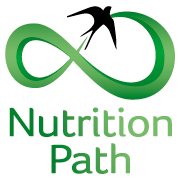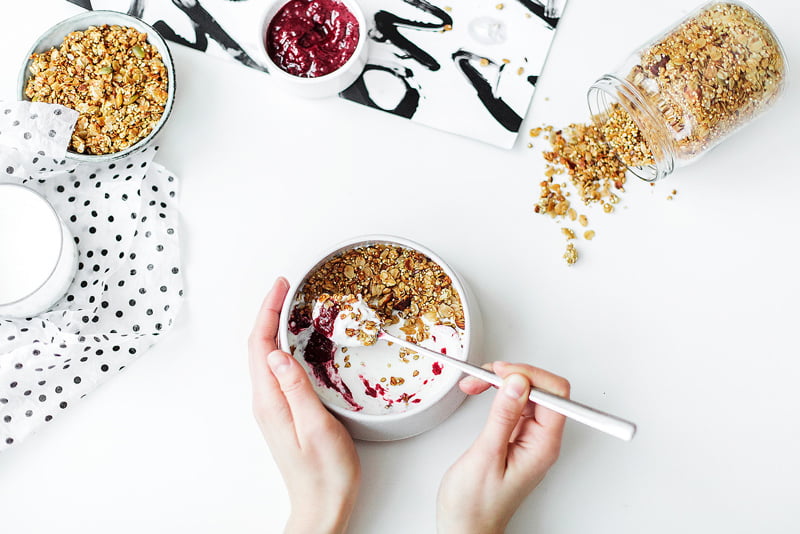So what is it about calories that’s so appealing?
I was searching for the ‘perfect solution’ to achieve health and particularly, weight loss goals. Yes, at 14!
But even back then the internet had ‘the best’ advice for me and million other desperate women, who were (and are still) looking for the magic pill that will make things better overnight.
Although mindful and intuitive eating is the ONLY way to achieve those goals and sustain them long-term, we live in a world where instant solutions always win over long-term balance and any theory of trusting your body instead.
Somewhere along the way we lost the trust in our bodies to tell us what they need and we fear that, if we give our bodies exactly what they asked for, we’ll ‘get fat’ and eat sugar all the time.
‘If only someone could just tell me what to do or what to eat..’
Whereas mindful and intuitive eating is based on reflection and physical and emotional feelings, calories provide solid data, that takes away the ’listening to your body’ factor. Sounds pretty logical and straightforward, right?
There is only one little issue- calorie counting does not work long-term and can actually do more harm than good. Here's why counting calories is not a good idea and should be avoided even if your goal is weight loss:
Not all calories are equal
The 80s are gone and we should move on from this very limiting mindset that you can simply count calories, restrict, exercise like a crazy person and lose weight.
Heard the saying ‘a calorie is a calorie’?
Wrong. A calorie is not just a calorie. It really matters where it comes from and what it is. 300 calories of homemade salad and 300 calories of processed pot noodle are not equal. Just like 200 calories of avocado and 200 calories of digestive biscuits.
Certain foods contain vitamins, minerals and antioxidants, which boost the nutritional value of these foods, yet never appear on the label. And without them, our health suffers and nutritional deficiencies start to surface.
The body needs a different amount of energy to process different macronutrients, which is called the thermic effect of food (TEF). That only means that your body expends a different amount of energy to digest and absorb protein than it does to carbohydrates. This is why calories in is NOT equal calories out.
In conclusion, unless you eat the same type of food every single day (which will not only drive you nuts but might also create nutritional deficiencies), there is zero proof that all calories are the same.
So let's start treating them for what they really are: different foods with different benefits and nutrition.
Your energy needs vary every single day
Your body is a complex mechanism and something as simplistic as saying that it needs e.g. 2000 kcal every day is too restrictive. Our energy needs fluctuate from day to day depending on a variety of factors, such as activity level, whether your body is recovering from anything, stress and emotions.
Contrary to the popular belief, you do not have to do heaps of physical activity to burn lots of calories, as there are other strains on the body that require a similar amount of energy, such as emotional stress and study.
Do you notice how exhausted you feel after a busy day or a phone call with that friend that zaps your energy?
The brain uses around a third or a fourth of daily energy, but if you're sitting in lessons all day, working really hard on the new creative project or writing a PhD thesis, your energy requirements are hugely increased. And you don’t even have to put your trainers on.
And so there is no book, diet or person, who could tell you exactly how much energy you need every single day, which makes the whole process of calorie counting redundant and inaccurate.
Calorie counting can mess up your food relationship
The majority (if not all) of people who suffer from eating disorders, emotional eating and weight problems have at some point tried calorie counting and it has just made the situation worse.
Calorie counting can get you really really stuck.
Counting calories is restrictive, it instils fear and obsessing around food, is completely unrealistic and creates habits that are unsustainable. And when the pressure gets too much, that's when the inner saboteur comes out to play and only one step away from the ‘calorie plan’ turns into bingeing and overeating, followed by food guilt.
If you want to restore your food relationship or cultivate a healthy balance, start with ceasing calorie counting. Your future self will thank you for it.
Fats are high in calories for a reason
People who count calories, often shy away from foods high in fat. It may seem that fats is the first group that needs to be ‘limited’ or restricted due to huge calorie numbers. Why add a splash of olive oil on the salad, when calorie-wise it’s equal to a small snack?
Quality fats are absolutely essential not only for energy purposes, as building blocks for the majority of hormones and a well-functioning brain, but it is crucial for maintaining a healthy weight. In a very simplistic way, good quality fats make your metabolism ‘happy’ and keep weight and health in good balance.
Have you noticed how easy it is to drink a bottle of Coke pretty much effortlessly, but almost impossible to drink the same amount of full-fat Greek yoghurt? Foods also have different satiety levels and quality fats, such as avocado, nuts, fish, full-fat dairy, coconut products, olive oil etc., keep you fuller for much longer, creating less need for extra food.
Fats also contain the majority of flavour in foods, so if you see foods that are low fat, be aware that these foods are often packed with sugar instead just to keep them tasty and appealing. These foods might contain less calories than a full-fat version, but it will be less satisfying, it will likely create sugar cravings and will have you reaching for ‘something else’ in no time.
Quality, not quantity
The nature of calorie counting is in the focus on quantity and numbers. Yet, there's so much more to that than a simple number. It also matters where the food comes from, how nutritious it is, whether is it processed, how it's been raised/ grown and whether it's organic. It even matters if it's season/ local, a sit contains much more nutrition that way.
Instead of calories, focus and have as many whole foods as possible that come from nature, rather than foods made in a factory. Instead of counting calories, count experiences with different foods, flavours, spices and pleasure that you get from food. Foods that contain more nutrition tend to reduce cravings, increase your satiety and general well-being and quite frankly, leave a good taste in your mouth (excuse the pun).
The more nutritious and delicious your foods are and the more relaxed you are while eating, the more likely you are to manage your weight naturally and curb sugar cravings for good.





